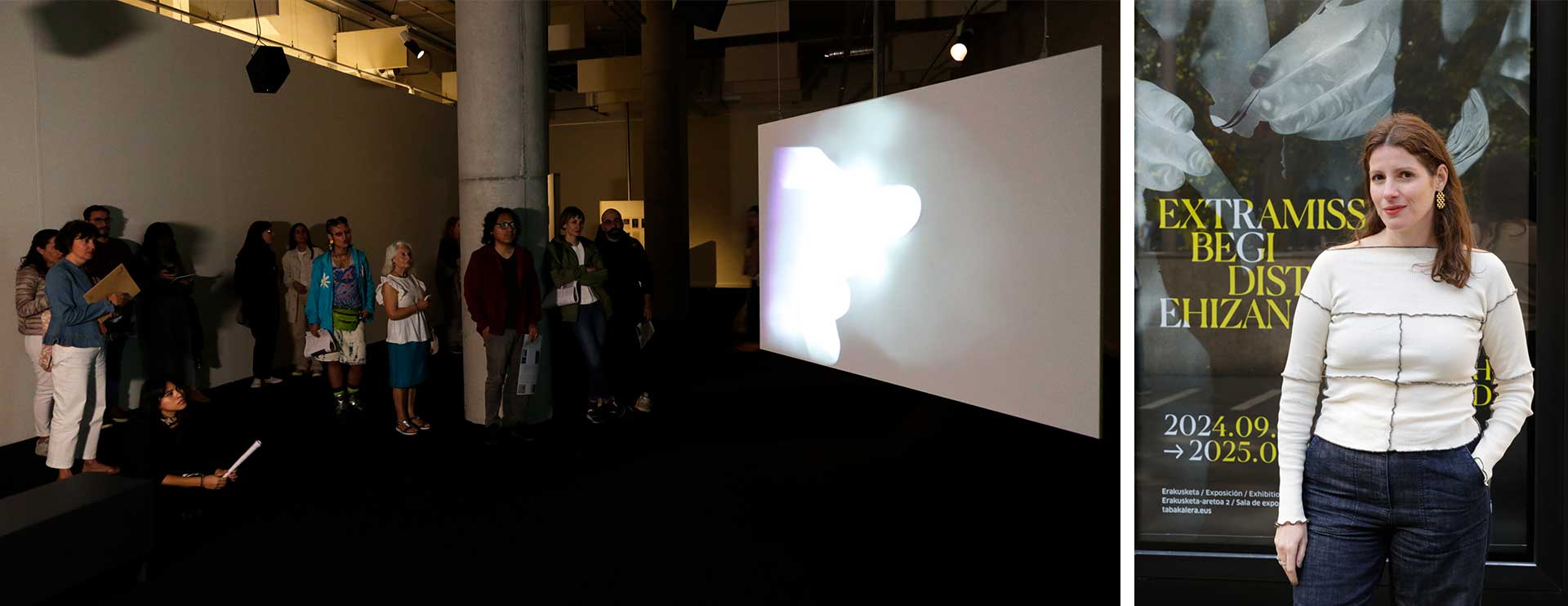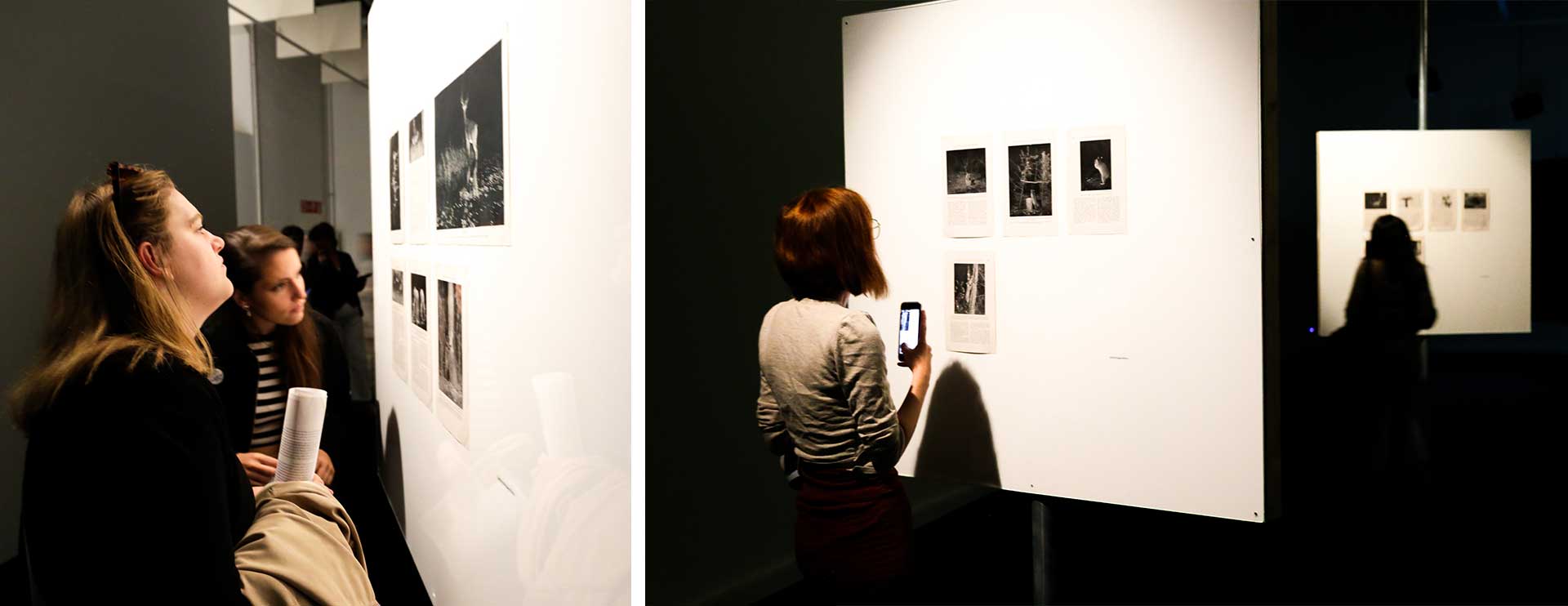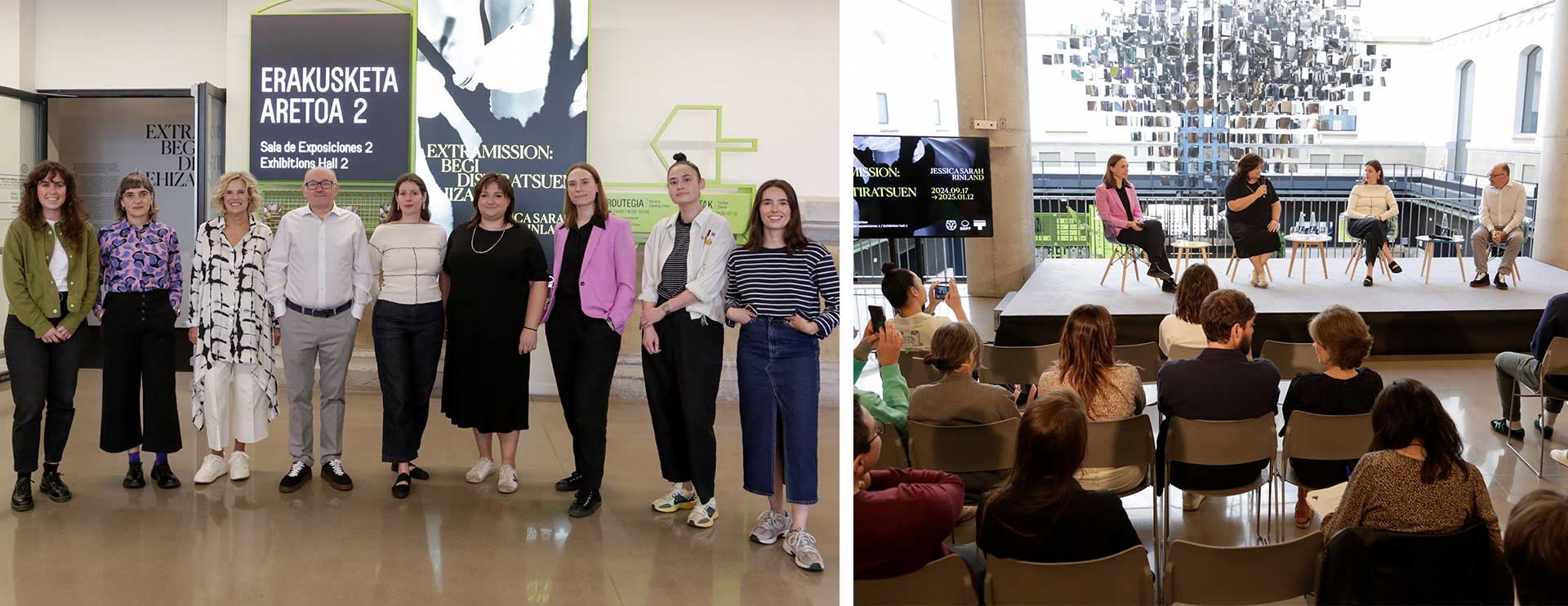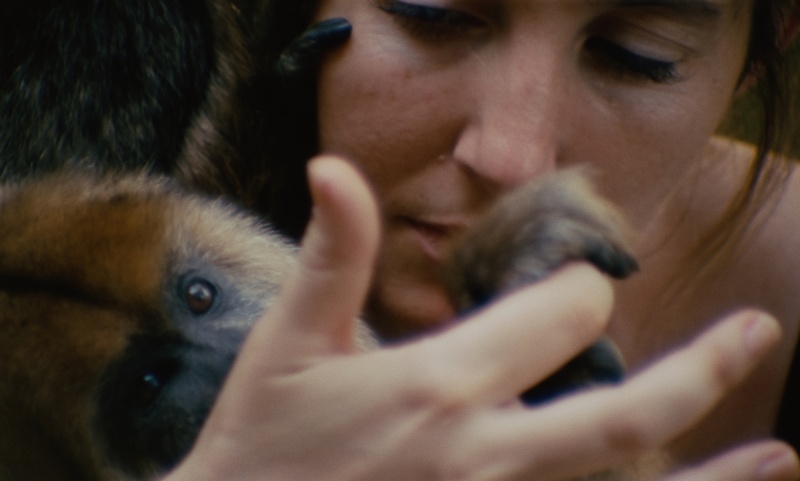The exhibition will be open to the public in the Tabakalera Exhibition Hall 2 until 12 January 2025 and will later be shown at the Rotterdam Festival
The Argentine-British filmmaker, who has had a residency at Ikusmira Berriak, will present her latest feature film, ‘Monólogo colectivo / Collective Monologue’, in the Zabaltegi-Tabakalera section
Today, the Tabakalera International Centre for Contemporary Culture, in collaboration with International Film Festival Rotterdam (IFFR) and the San Sebastian Festival, opens the exhibition Extramission: The Capture of Glowing Eyes, created by the renowned Argentine-British filmmaker Jessica Sarah Rinland.
The exhibition is an example of Tabakalera’s efforts to promote artistic and audiovisual creation and encourage the intersection between contemporary art and film. Jessica Sarah Rinland, who had a residency within the Ikusmira Berriak programme, will also be presenting her latest feature film Monólogo colectivo / Collective Monologue at the San Sebastian Festival in the Zabaltegi-Tabakalera section.

Audiovisual installation and historical archive
One of the central features of the exhibition Extramission: The Capture of Glowing Eyes is the way in which Rinland combines early 20th century archival material from National Geographic magazine with new moving images and audio recordings.
Rinland’s audiovisual installation, curated by Tabakalera, includes two-channel video, each ten minutes long, which are projected in black and white with multi-track sound. The first was recorded at the Natural History Museum in London using thermal cameras, a technology originally employed in hunting and surveillance. These cameras capture the work of curators restoring stuffed animal specimens ready to be moved. In the video, the hands of the conservators, seen through the thermal camera, glow in contrast to the still, cold bodies of the animals, creating a visual metaphor for the relationship between humans and nature.
The second projection focuses on infrared images provided by the Rewilding Argentina foundation, which documents the process of reintroducing animal species into their natural habitats after having been kept in captivity in Europe. The infrared cameras capture the glow in the eyes of the otters, evoking the visual phenomenon described by the theory of extramission, one of the earliest theories of how humans perceive the world through the light emitted by the eyes.
The exhibition also highlights the work of George Shiras III, a pioneer of wildlife photography whose innovative techniques, such as the invention of the camera trap, revolutionised the capture of images of animals in their natural environment. Shiras employed methods derived from ancient indigenous hunting techniques, such as the use of fire to lure the animals, which later enabled him to use his camera to capture those moments when the animals’ eyes reflected the light. The framed pages from National Geographic in the exhibition reproduce historical images documenting this type of photographic experimentation and its impact on the science of wildlife conservation and documentation.
In this way, the exhibition raises questions about contemporary acts of conservation and their relationship to past violence. Through the combination of modern technology –such as thermal and infrared cameras– and historical material, the work suggests that conservation not only preserves life, but also brings with it a confrontation with the past and the tensions between humans and the natural environment.
With this show, Rinland transforms the exhibition space into a place of visual and sensory exploration, where the viewer is invited to reflect on the legacy of documentary photography and its impact on the present.

International collaboration and support for contemporary creation
This is the second collaboration between Tabakalera, International Film Festival Rotterdam and the San Sebastian Festival. The first was Vive le cinéma!, an exhibition that in 2022 brought together the audiovisual creations of film directors Dea Kulumbegashvili, Isaki Lacuesta, Lemohang Jeremiah Mosese and Jia Zhang-ke. The four filmmakers adapted their usual practice, making films, to create audiovisual pieces to be seen in an exhibition hall. Captives, the proposal that Kulumbegashvili created for the exhibition, was selected to participate in Rotterdam Film Festival in 2023, and gave rise to the Georgian filmmaker's new film, Aprili / April, which will close the Zabaltegi-Tabakalera section of the upcoming San Sebastian Festival after being awarded with the Special Jury Prize at the Venice Festival.
This new collaboration underlines the centre's commitment to audiovisual and artistic production, and reinforces its track record of supporting artists such as Jessica Sarah Rinland, whose work has been supported by Tabakalera's audiovisual laboratory and by the Hubert Bals Fund in its post-production phase. It should be noted that Tabakalera's commitment to audiovisual works has also been reflected in previous exhibitions, such as the aforementioned Vive le cinéma! (2022), and the exhibition dedicated to the creation process of the animated film El sueño de la sultana / Sultana’s Dream by Isabel Herguera (Official Selection, 2023).
The exhibition can be seen in the Tabakalera Exhibition Hall 2 until 12 January 2025. The programme of activities to complement the exhibition includes three sessions at the Tabakalera cinema with works by Jessica Sarah Rinland and Gerard Ortín, creating a dialogue between their creative processes and thematic approaches. Both filmmakers will visit Tabakalera to present their films. In addition, the usual dialogued visits and workshops will be offered to explore the themes of the exhibition in more depth.

Biography
Jessica Sarah Rinland is an Argentine-British filmmaker and visual artist known for her work exploring the intersections between science, natural history and material culture. Her work encompasses film, photography and multimedia installations. Rinland has presented her work at prestigious film festivals and contemporary art centres, including New York Film Festival, BFI London Film Festival, Mar del Plata, Rotterdam, Oberhausen, Edinburgh International Film Festival, Bloomberg New Contemporaries and Somerset House. She has won awards including Primer Premio at Bienale de Imagen en Movimiento, Arts + Science Award at Ann Arbor Film Fetisval, ICA’s Best Experimental Film at LSFF, and M.I.T’s Schnitzer prize for excellence in the arts. She has received grants from Arts Council England, Wellcome Trust, Elephant Trust and elsewhere. Residencies include the MacDowell Colony, Kingston University, Locarno Academy and Berlinale Talents. She is currently an Associate Artist at Somerset House Studios and a Film Studies Center Fellow at Harvard University. Throughout her career, she has received multiple awards and has participated in numerous residencies, such as Tabakalera’s Ikusmira Berriak and the San Sebastian Festival in 2020.
Intimate and fragmented moments unfold in a community of zoos and animal rescue centers across Argentina. As histories of these institutions are uncovered, dedicated workers commit both day and night to caring for the remaining enclosed animals, fostering a mutual bond that transcends imagined boundaries between human and animal.






